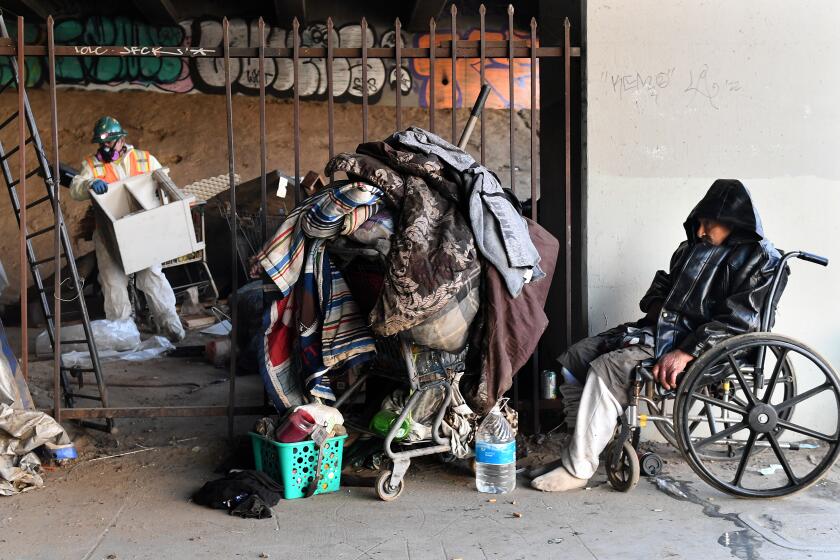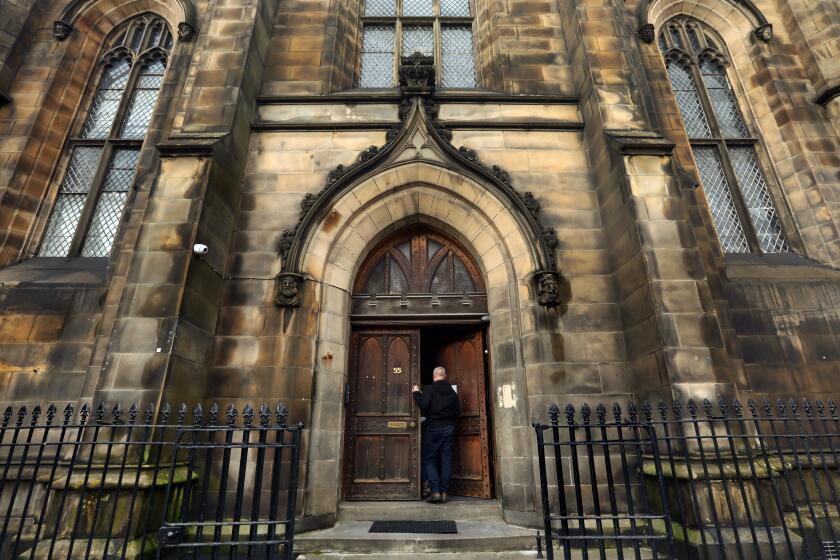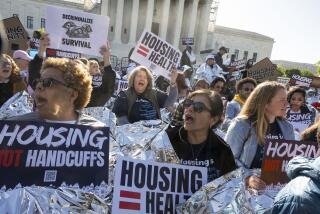
From their modest apartment buildings alongside a block-long strip of gravel and scrub grass, the residents can see the tents and tarps and empty Mountain Dew bottles, hear the late-night fights and occasional gunshots, and smell the stringent, slightly sweet odor of burning fentanyl.
“It brings the value of the properties down,” said Shawn Matthews, a 46-year-old medical services driver who lives in one of the buildings. “But where else are people going to go?”
It’s the question communities throughout the West and the rest of the country are struggling to answer. This week the Supreme Court heard arguments about a law in Oregon that allows police to forcibly clear homeless encampments.
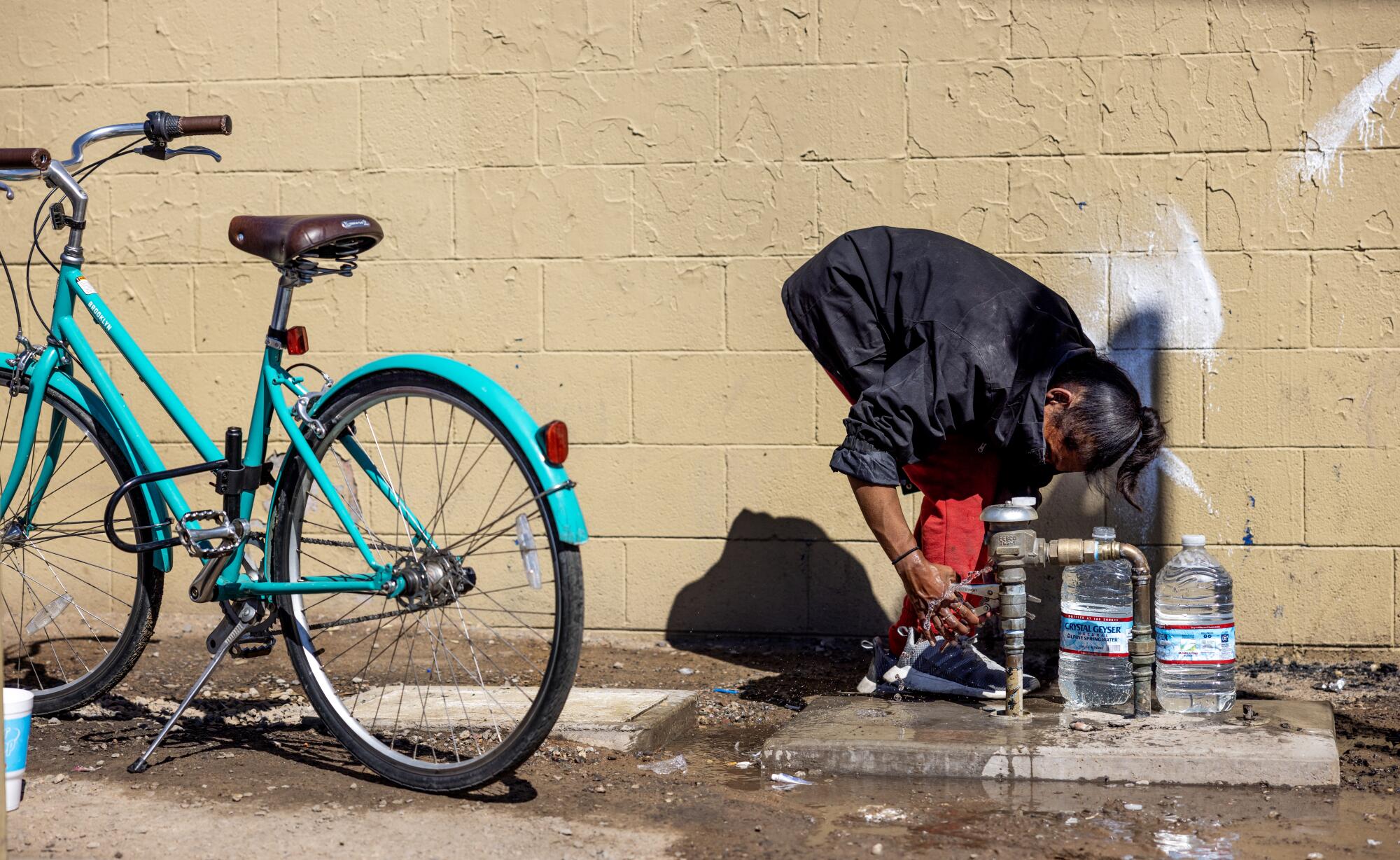
Here in Arizona, a novel response has emerged, one that has alarmed homeless rights advocates and mayors but that could win favor among a public that has grown weary, and in some cases angry, with public encampments. Voters will decide this November on a ballot initiative to award property owners tax refunds if they can prove monetary damages resulting from their local government’s failure to enforce nuisance laws.
The initiative’s authors see it as a potential model for other states. That’s what its opponents fear.
Such a model would represent a shift for many states and localities that have more often asked voters to spend money on housing, drug treatment and mental health services that researchers have found more effective than a punitive approach to addressing homelessness.

Subscribers get exclusive access to this story
We’re offering L.A. Times subscribers special access to our best journalism. Thank you for your support.
Explore more Subscriber Exclusive content.
But patience for such spending may be thinning, even in liberal states. In March, California voters only narrowly approved Gov. Gavin Newsom’s plan to spend $6.4 billion to overhaul the state’s mental health system.
In the neighboring swing state of Arizona, Phoenix has been roiled for the last year by a lawsuit that forced the city to clear its biggest encampment, a shantytown of hundreds of people on the edge of downtown.
Matthews didn’t know much about Arizona’s ballot initiative but said it sounded like something he would support.
“They need a better environment,” he said. “Because it’s very dangerous to be living on the streets.”
He would know. He was once homeless himself.
So are more than 14,000 Arizonans on a given night — a homeless population less than half the size of California’s on a per capita basis, but still one of the nation’s largest, according to federal statistics that are known to understate the problem.
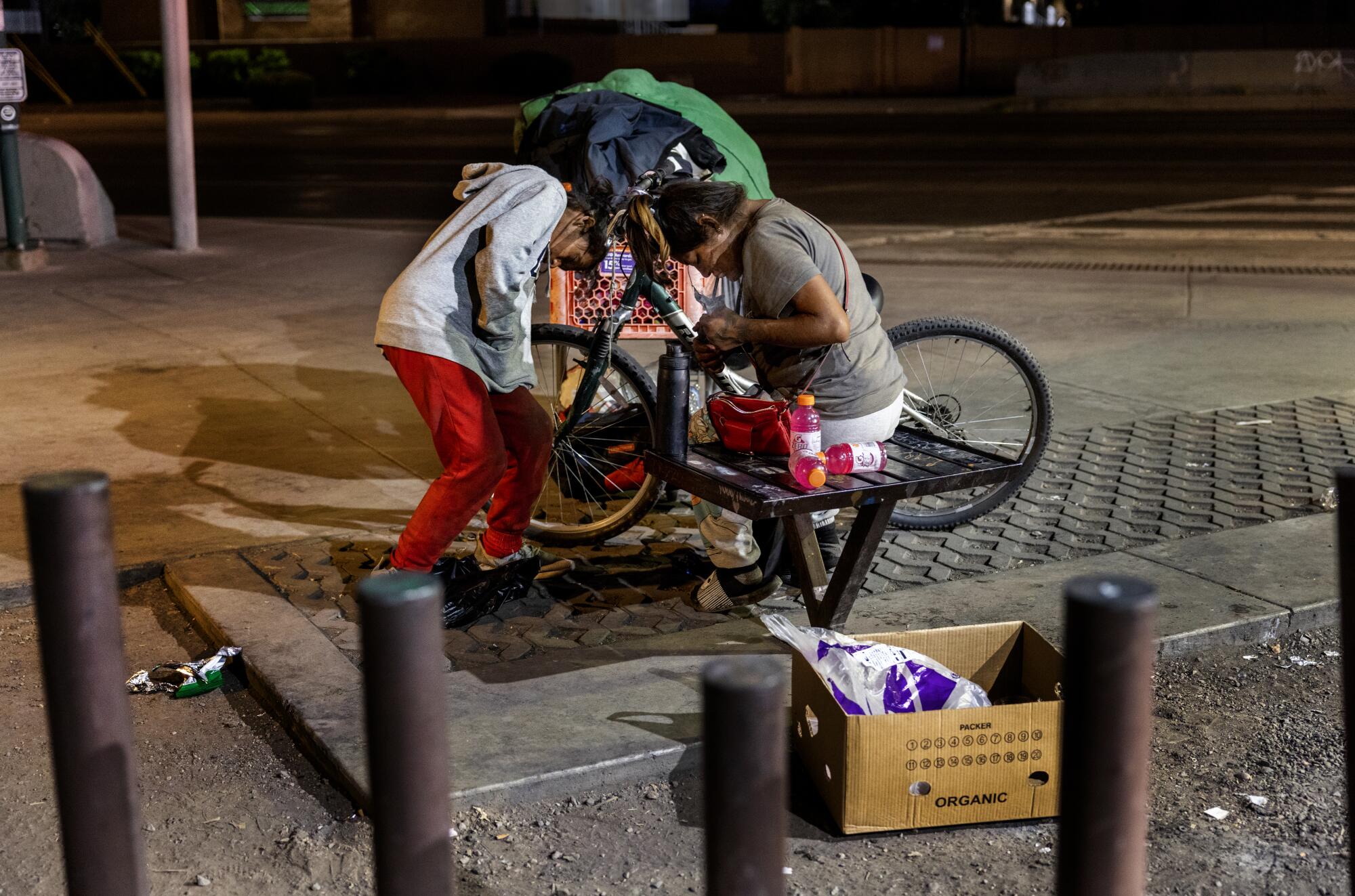
Only one other state — Nevada — has fewer affordable homes per capita for extremely low-income renters, according to a report by the National Low Income Housing Coalition. (California is tied with Arizona for its lack of affordable units.)
Though poverty, mental health issues and addiction often afflict homeless people, the lack of affordable housing is the biggest factor in driving up the overall homelessness rate, according to specialists and research.
Rulings by the 9th Circuit Court of Appeals have made it harder for officials in California and other Western states to clear encampments. The Supreme Court could take up the issue early next year.
Most of Arizona’s homeless people are living on the streets rather than in shelters — one of the highest shares of unsheltered homeless people in the country — and the bulk of them are in Phoenix and surrounding Maricopa County.
On a recent spring morning, a pair of homeless outreach workers in their 20s, Tyler Boyd and Charles Schmiedeke, toured the city in a Toyota RAV-4. Each felt a calling for their work — Boyd after his prayer for a homeless man to find a job was answered, Schmiedeke after four years spent living on couches and in cars with his mother.
1
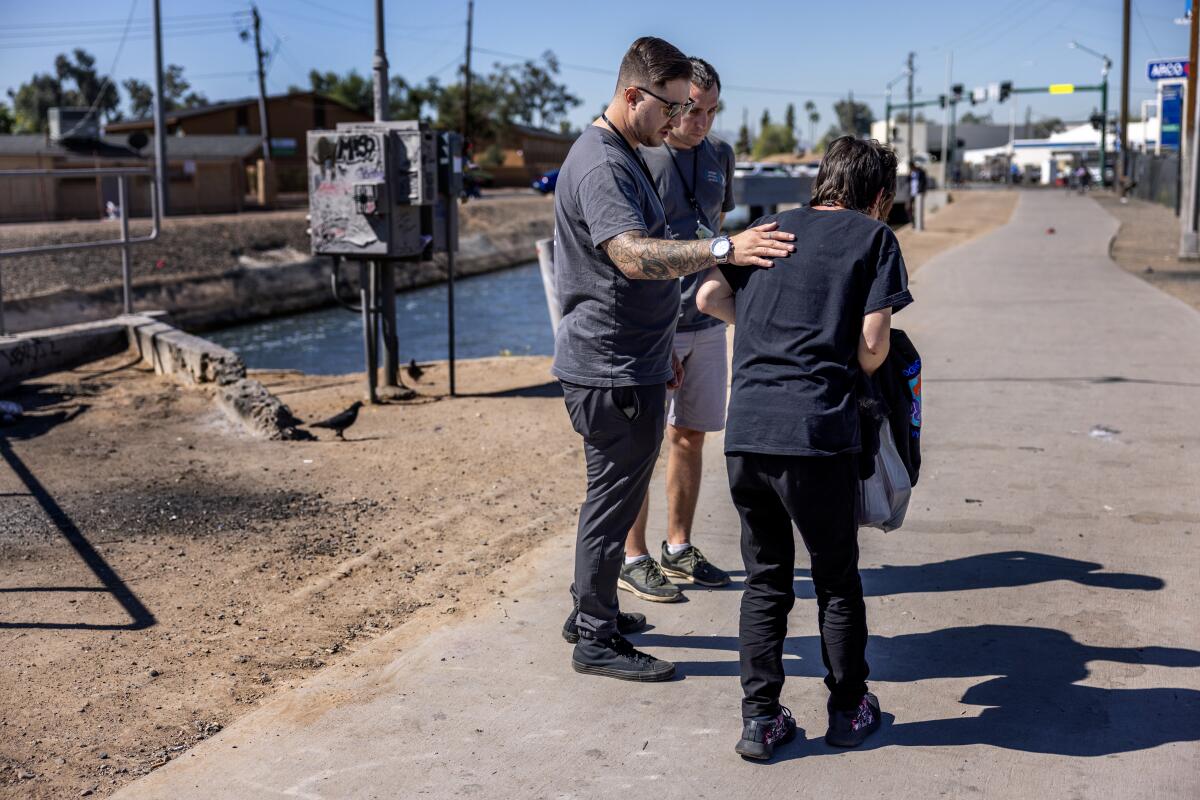
2
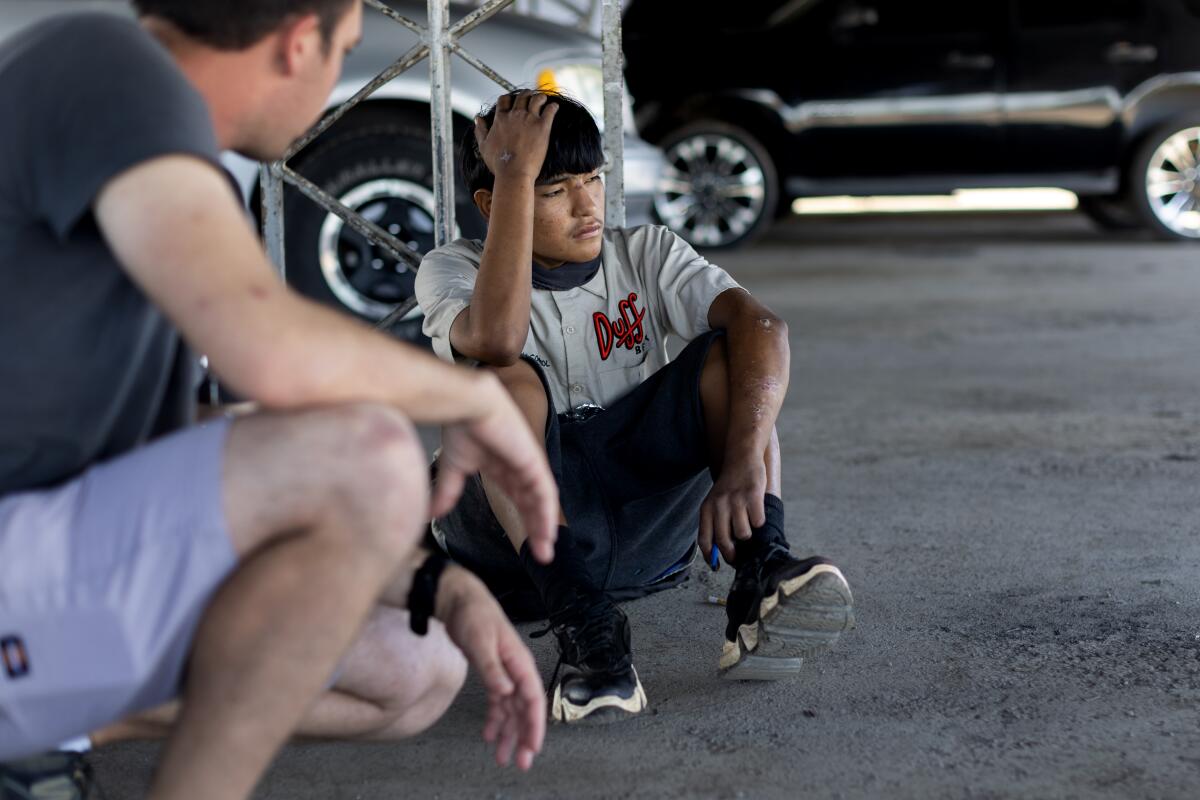
3
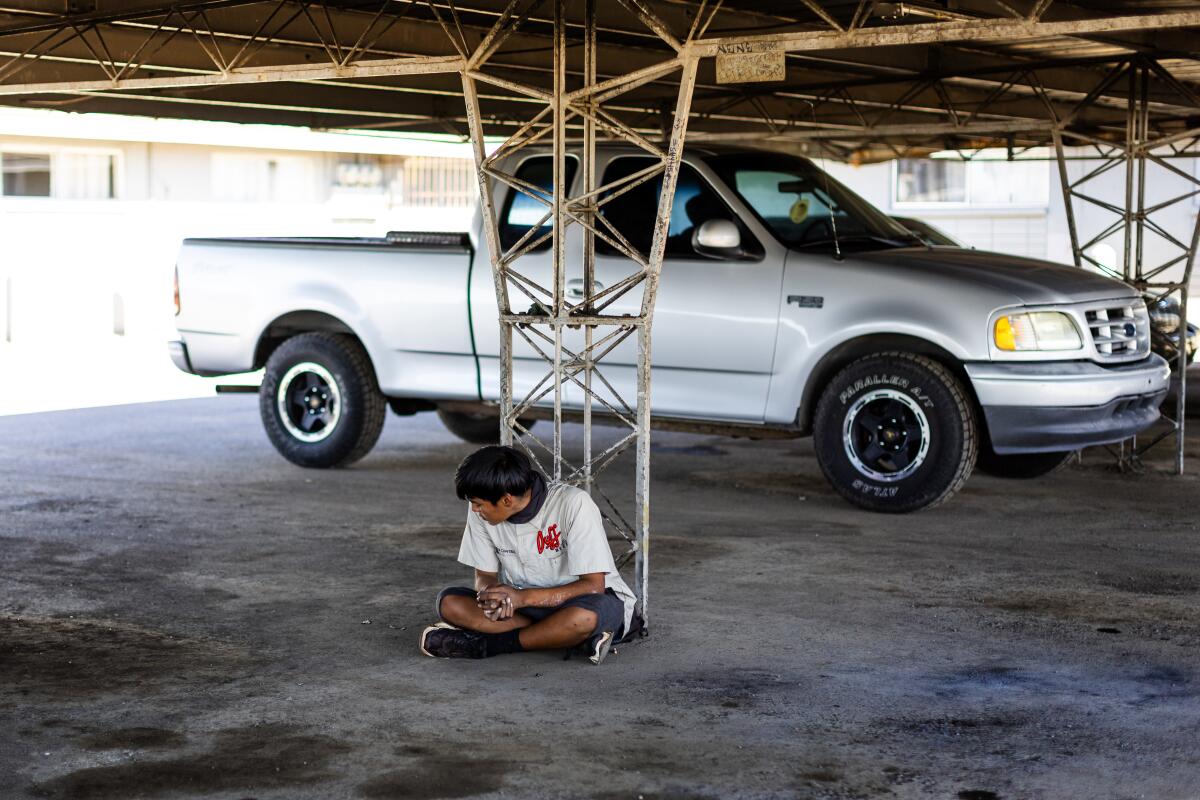
1. Outreach workers Charles Schmiedeke, left, and Tyler Boyd feel drawn to seek out homeless people in Phoenix, like this woman struggling with trauma, and get them the help they need. 2. Tyler Boyd talks with a withdrawn Anthony James, who’s been struggling on the streets since his mother died two years ago. 3. James, 19, declined the outreach workers’ offers of help one recent morning. Others were near their breaking points, ready to accept various kinds of treatment.
They met a withdrawn 19-year-old named Anthony James, who has been on the street for two years, since his mother died. He was nodding off by an apartment dumpster and declined their help.
A woman who told them she’d lost her mind began sobbing and recounting childhood traumas as she repeated the word “suicide,” before agreeing to go with them to find professional help.
A third person, Diamon Bauldwin, 38, asked for help getting medical care. She’d had trouble breathing a few nights earlier, part of a decline that started more than a year ago as she ran out of insulin and began losing her vision.
Bauldwin lives in a tent under power lines with an adopted group of friends she calls a family. She hasn’t seen her two teenage children in months. One of them is locked up.
She pointed over a wall toward what she said was her former home — in an apartment near Matthews, the medical services driver.
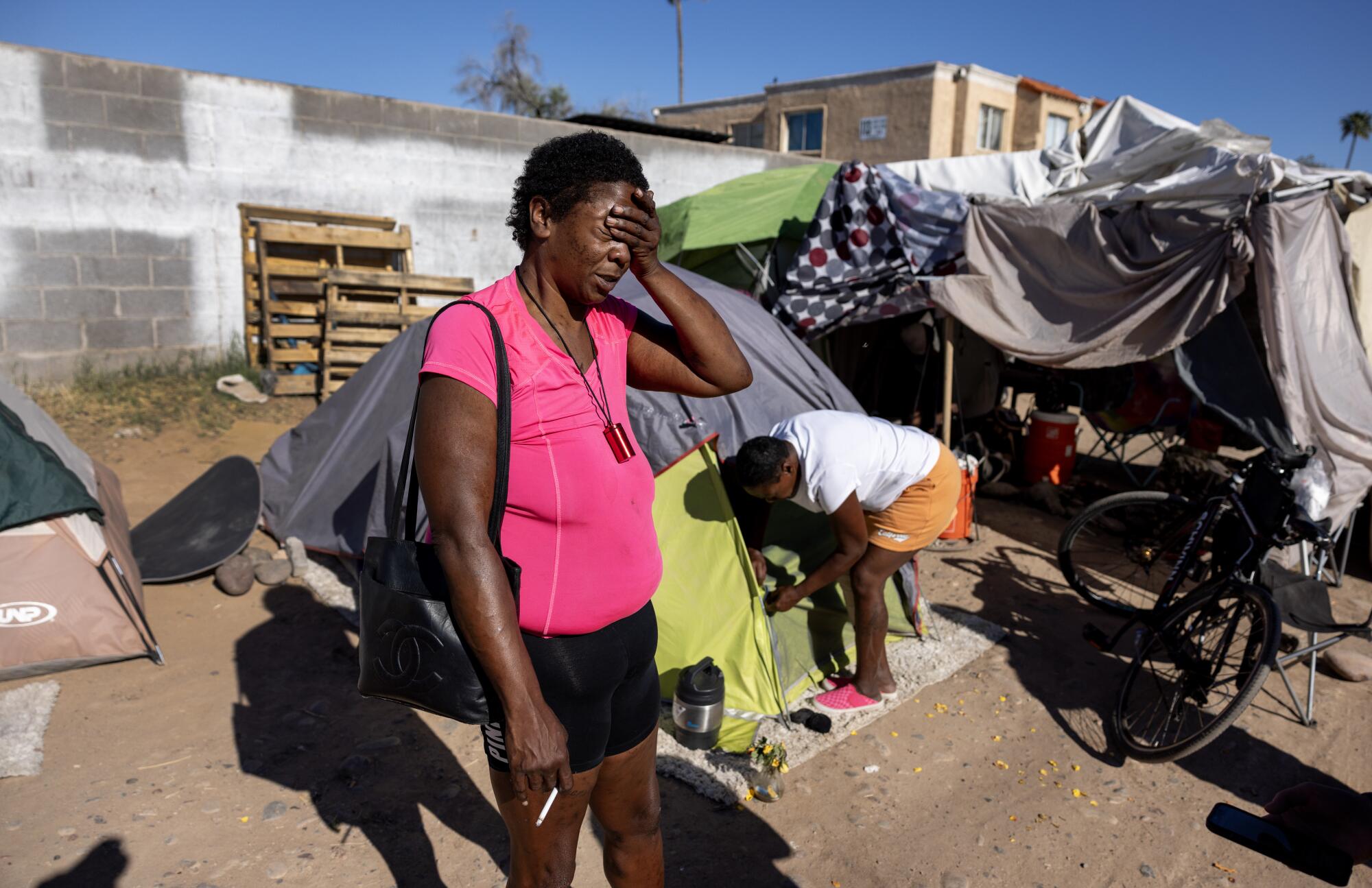
She wants that life back, Bauldwin said, but the first step, a shelter bed, has been out of reach. Life has been even harder since the police started enforcing trespassing laws, intermittently kicking her off the property.
“I understand they’re cracking down,” she said. “Some of us really don’t have options.”
Boyd and Schmiedeke share her frustration.
“Making it illegal to be homeless is basically making it illegal to go through those circumstances that gets you to that point,” Schmiedeke said. “You know, we need to tackle the barriers that lead to this point, not the point itself.”
Most of the city’s shelters for homeless people are on 13 acres on the edge of downtown, by railroad tracks, warehouses and a historic cemetery. The Key Campus as the complex is known, includes eight buildings and most necessary services, including counseling, job help, mail services and converted trash bins where people can lock up personal possessions.
On most days, about 2,000 people pass through, about half of whom spend the night.
Many in Los Angeles and California support a legal right to housing. Here’s how that works in Scotland.
Those who work with homeless people benefit alongside their clients from the one-stop-shopping nature of the campus, but it has also created a major problem in the larger community. In recent years, the sidewalks outside Key Campus became known as “the Zone” — home to a skid-row-like cluster of tents, with hundreds of people sleeping on the pavement, block after block.
Property owners said they could not open their gates or have visitors. There were fires, drugs, bursts of violence and crime, and deaths. People sometimes extorted one another for rent or fought over turf.
One property owner, Angela Ojilie, keeps photographs of the cat that someone set on fire, and that she eventually nursed to health. She also has pictures of her front gate, so crowded with tents she could not get in and out of her warehouse.
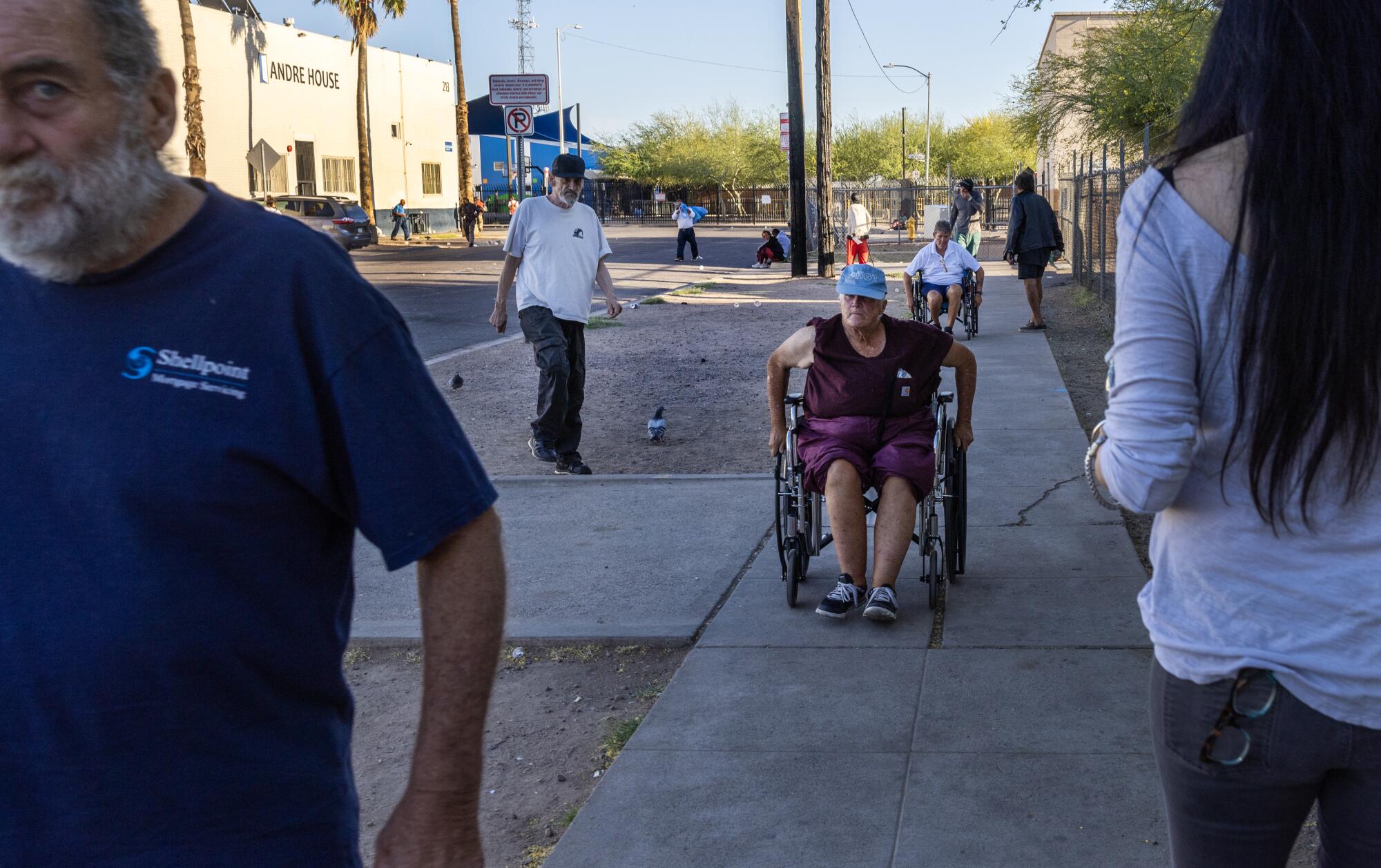
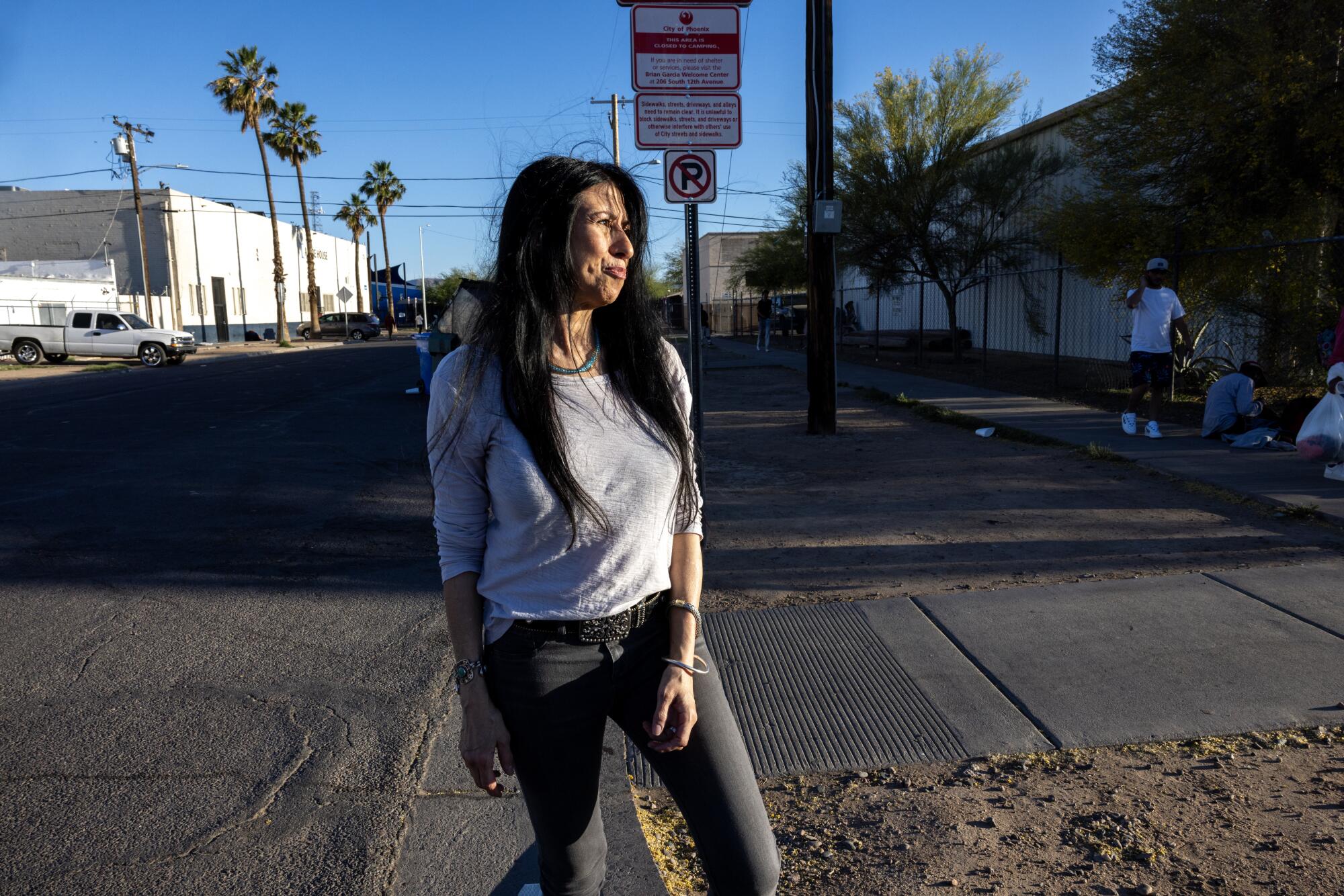
Property owners often helped homeless people with money and jobs, but the situation had gotten out of control, she said. The property owners sued the city.
Judge Scott Blaney of Maricopa County Superior Court found that police were not enforcing “criminal, health, and other quality of life statutes and ordinances.” Last November, he ordered the city to clear the Zone.
The attention created momentum for the ballot initiative, approved by the Republican-led Legislature last month for the fall election through a process that allowed them to bypass Gov. Katie Hobbs, a Democrat who last year vetoed a measure to crack down on homeless people.
“Being so close to us, we kind of watched this, and it was terrible and we want to stop this from ever happening again,” said Jenna Bentley, director of government affairs for the Goldwater Institute, a conservative-libertarian Phoenix think tank, which that drafted the ballot measure.
Bentley called the measure a first step for more reforms.
If it passes, property owners could claim tax refunds for “documented expenses,” such as cost of security bars, if they can show they were harmed by a local government’s pattern of failing to enforce laws against camping, obstructing thoroughfares, loitering, panhandling, public drinking or using illegal substances.
Bentley said a business’ lost revenue would not be an eligible expense.
Critics of the initiative say it is vague and would put the burden on the local government to disprove a property owner’s claim.
William Knight, a Phoenix resident and chief litigator for the National Homelessness Law Center, says it’s also “a really asinine and really gross new form of grievance politics” that targets the least powerful people, who are disproportionately Black, young, poor, veterans and victims of domestic violence.
Phoenix Mayor Kate Gallego said her staff is still assessing the measure’s possible effects, which could range from minimal to “devastating to our budget.” But even processing the claims will consume city resources, she said.
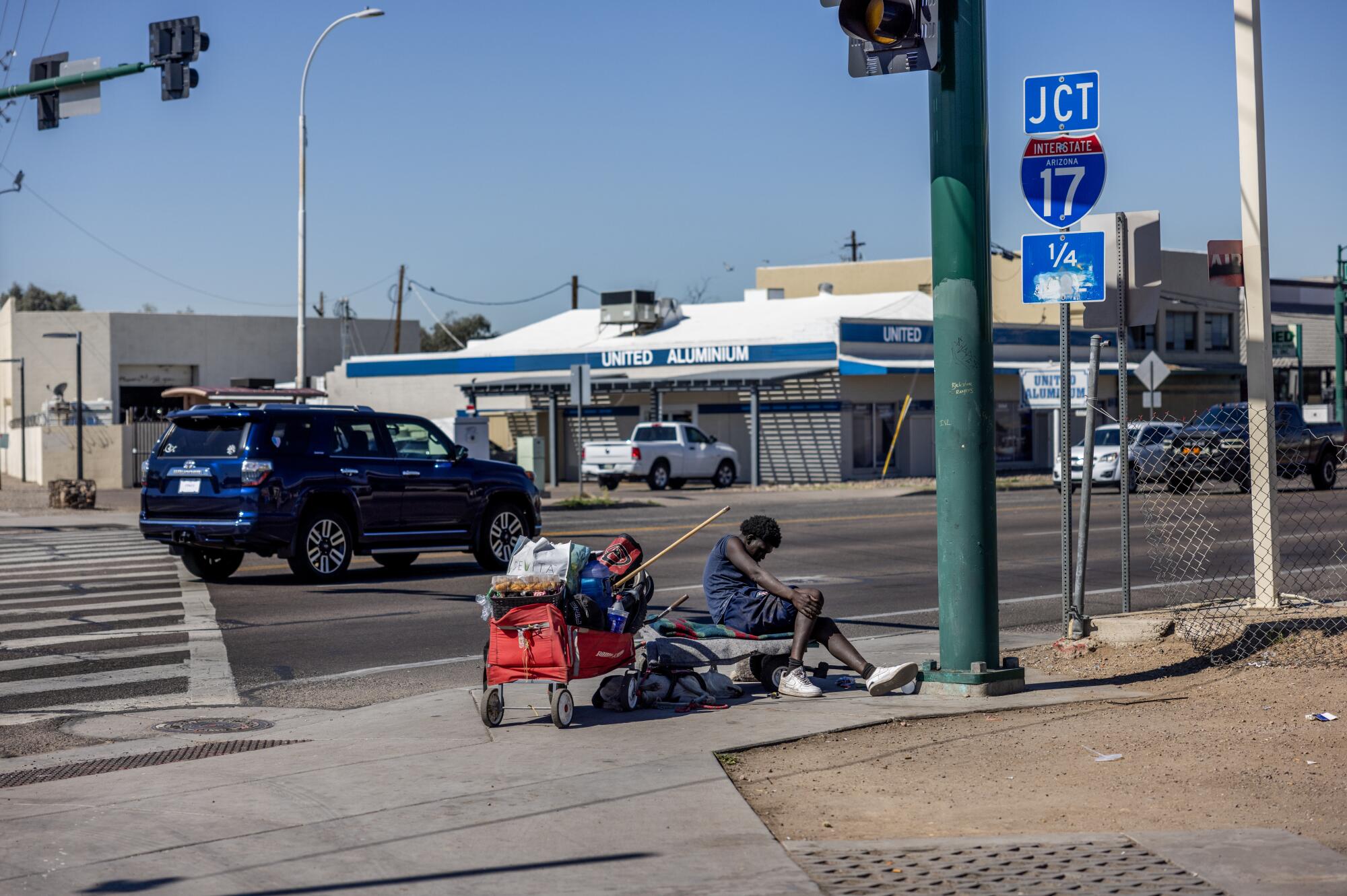
“My message to the Legislature is, they’re focusing on the wrong areas,” she said. “If they would fund housing and mental health care, we could do so much to fight homelessness.”
Neither of the bill’s sponsors agreed to requests for interviews.
Gallego said that she has focused on building more affordable housing but that the city has no direct control over drug treatment and mental health.
Like other mayors, Gallego said she had been caught between lawsuits that demanded enforcement of anti-camping laws and the 9th U.S. Circuit Court of Appeals’ 2018 ruling in Martin vs. Boise that restricted communities from arresting people for camping when there was no housing to offer them.
But there is debate over how cities are supposed to apply that standard — and the judge who ordered Gallego to clean up the Zone wrote that the mayor had misapplied it.
The U.S. Supreme Court heard arguments Monday in Grants Pass vs. Johnson, a related case that is likely to clarify the issue.
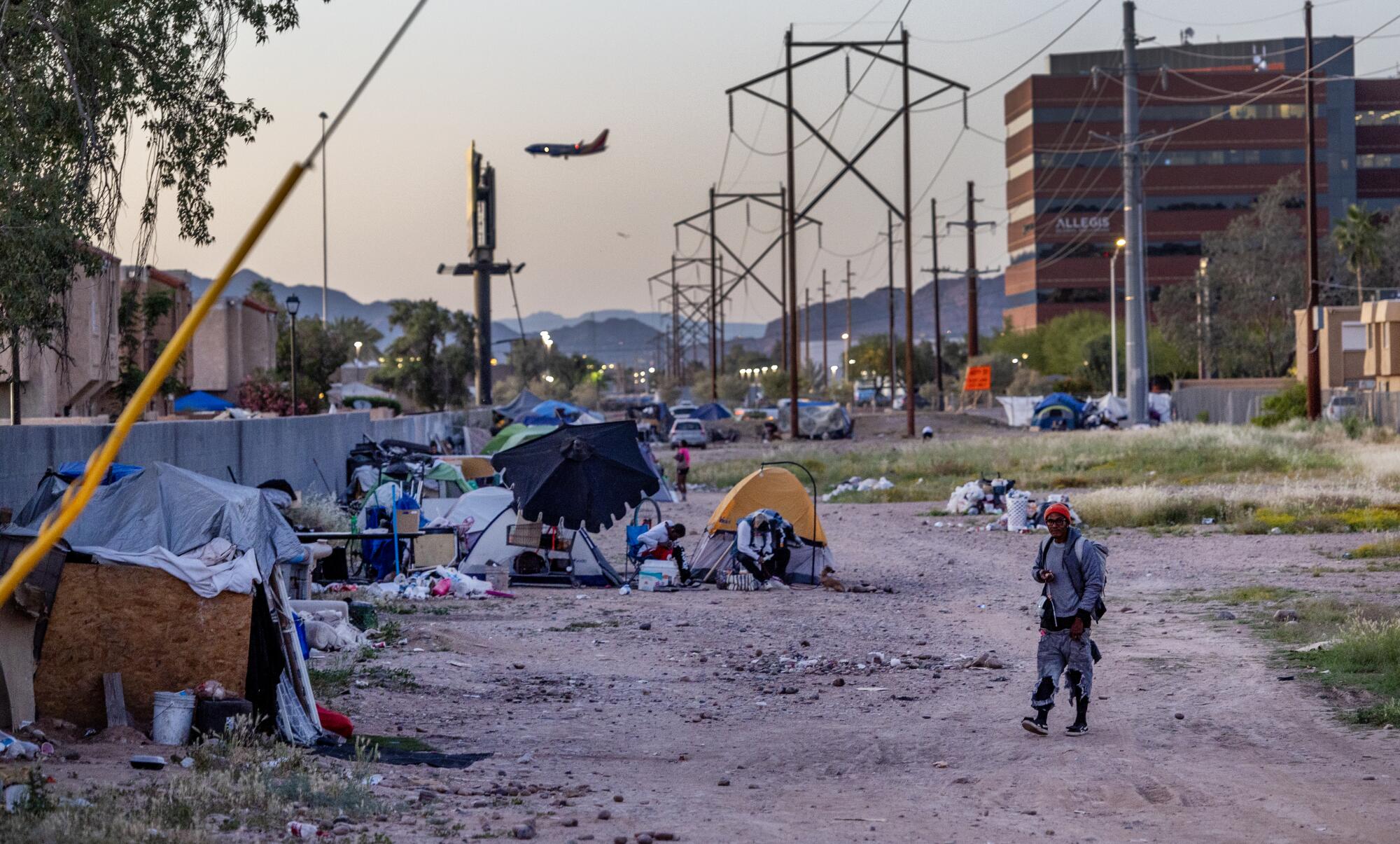
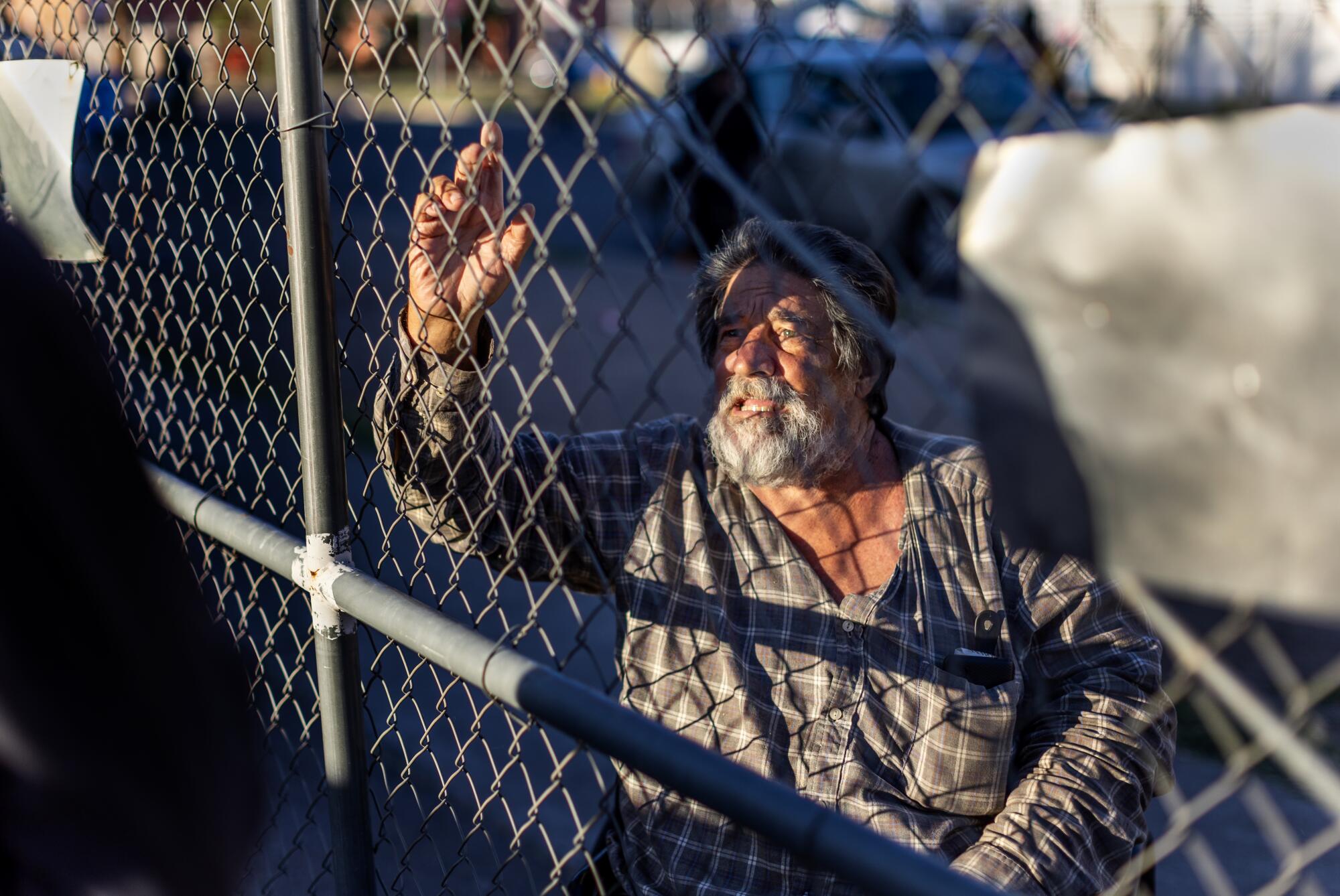
The Zone is clear of tents now — the majority of people who were living in them accepted the city’s offer of shelter or moved to other parts of Phoenix — but there are still people outside the gates of the homeless campus, eating meals, playing radios and riding bikes.
“The danger is the idiots that camp out around here — the junkies,” said Mike Fameli, who has lived in shelters and on the streets for four decades and used a wheelchair to navigate the street beside Ojilie’s property on a recent evening.
Property owners say the situation has improved, but they are resentful that the city let it get that bad.
Times staff writer Sandhya Kambhampati in Los Angeles contributed to this report.
More to Read
Subscriber Exclusive Alert
If you're an L.A. Times subscriber, you can sign up to get alerts about early or entirely exclusive content.
You may occasionally receive promotional content from the Los Angeles Times.

